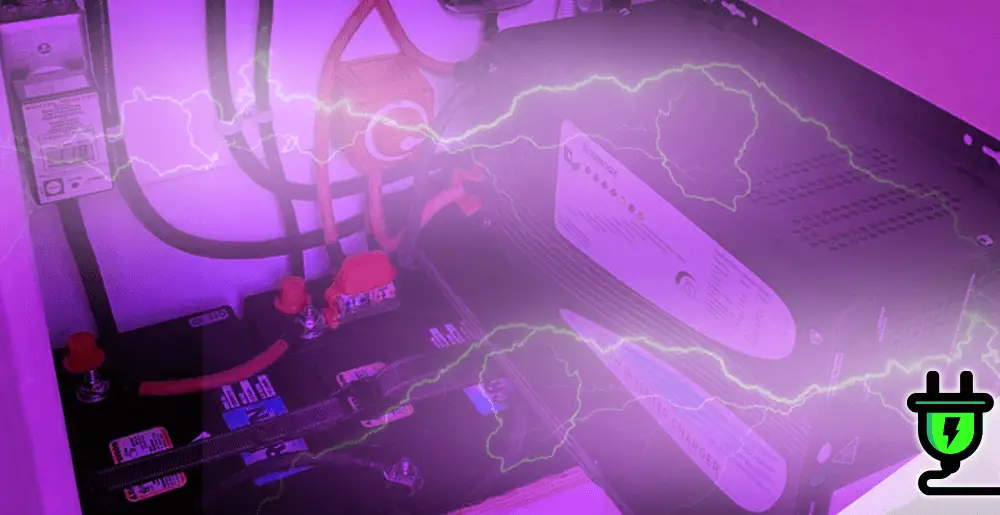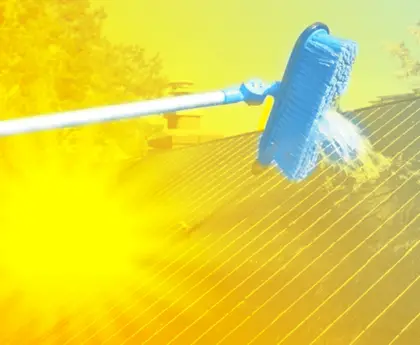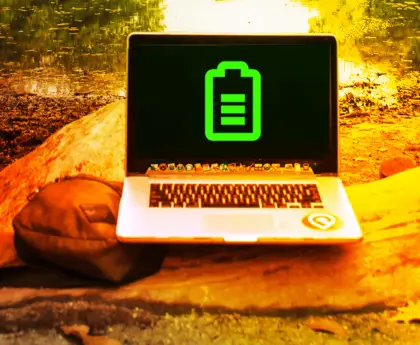Is your solar panel battery not holding its charge as well as it used to? You may be wondering why and how long do solar panel batteries last?
The lifespan of solar batteries ranges from 5 to 25 years. The most commonly used type, lithium-ion batteries, can operate effectively for up to 15 years.
Keep in mind, various factors influence the duration of a solar battery’s life, such as the kind of battery, how it’s installed, its depth of discharge, the number of life cycles, the environmental conditions, and how well it’s maintained.
In this helpful guide, we’ll explore the determining factors of a solar battery’s lifespan, which typically ranges between 5 to 15 years.
Stick around; you might discover ways to extend your own battery’s shelf life!
Factors That Determine the Lifespan of Solar Panel Batteries
The lifespan of solar panel batteries is influenced by various factors such as battery type, frequency of usage, environmental conditions, battery maintenance, and depth of discharge.
Battery type
Different types of solar batteries have varying lifespans. The most popular options include lithium-ion, lead-acid, and saltwater batteries. Lithium-ion batteries are known for their longevity and efficiency, often outliving their counterparts in the same usage conditions.
A good quality lithium-ion battery can function effectively for a period of 10 to 15 years before requiring replacement. Lead-acid batteries are an older technology with a shorter lifespan between 5 and 7 years but they remain widely used due to their lower upfront cost.
On the other hand, newer saltwater-based alternatives provide eco-friendly energy storage solutions albeit with currently limited long-term performance data available.
Frequency of usage
The frequency of usage is a crucial factor in determining the lifespan of solar panel batteries. The more frequently you use your solar energy system and drain the battery, the faster it will wear out.
Continuous charging and discharging cycles put strain on the battery cells, causing them to degrade over time. On the other hand, if you use your solar panels sparingly or only during peak hours, you can extend the life of your batteries.
It’s important to strike a balance between utilizing renewable energy and preserving the longevity of your solar panel batteries.
Environmental conditions
The environmental conditions in which solar panel batteries are installed can have a significant impact on their lifespan. Extreme temperatures, such as excessive heat or cold, can cause the battery to degrade more quickly over time.
High levels of humidity or moisture can also affect the performance and longevity of the battery. Additionally, exposure to harsh weather elements like rain, snow, or strong winds can result in physical damage to the battery casing or connections that may shorten its lifespan.
Therefore, it is important to consider these environmental factors when installing solar panel batteries and take appropriate measures to protect them from potential damage.
Battery maintenance
Proper battery maintenance is essential for maximizing the lifespan of solar panel batteries. Regularly inspecting and cleaning the battery terminals can help prevent corrosion and ensure a solid connection.
It is also important to keep the batteries in a cool, dry environment and avoid exposing them to extreme temperatures. Additionally, following manufacturer guidelines for charging and discharging can help prevent overcharging or deep discharging, which can shorten the battery’s lifespan.
Monitoring battery usage and addressing any issues promptly can also contribute to prolonging its life.
Depth of discharge
The depth of discharge refers to how much energy is drained from the solar battery before it is recharged. The depth of discharge can significantly impact the lifespan of a solar panel battery.
When a battery is discharged deeply, meaning a higher percentage of its capacity is used up, it tends to wear down faster and may have a shorter overall lifespan. On the other hand, shallow discharges where less energy is used can help prolong the life of the battery.
Therefore, it’s important to use and manage your solar panel batteries in such a way that you avoid deep discharging as much as possible.
Average Life Expectancy of Solar Panel Batteries
Solar panel batteries, also known as solar energy storage systems, typically have a lifespan of 5 to 15 years. The actual duration can vary depending on factors such as the brand and quality of the battery, usage patterns, maintenance practices, and environmental conditions.
While solar panels themselves can last up to 25-30 years, it’s important to note that the batteries usually have a shorter lifespan. Most solar batteries available today are designed to last between 10 and 15 years with proper care and usage.
However, it is essential to monitor their performance over time and be prepared for potential replacement within the next 5 to 15 years.
How to Prolong the Lifespan of Solar Panel Batteries
Proper maintenance and cleaning, avoiding overcharging and deep discharging, and monitoring and managing battery usage are essential for extending the lifespan of solar panel batteries.
Proper maintenance and cleaning
To ensure the longevity of your solar panel batteries, proper maintenance and cleaning are key. Regularly inspecting and cleaning your batteries can help prevent dust, debris, or any other material from accumulating on them.
This reduces the risk of damage or performance issues. Additionally, keeping the battery terminals clean and free from corrosion is important for optimal functioning. It’s also crucial to follow manufacturer recommendations for maintenance tasks such as equalizing charge or venting procedures.
By taking these simple steps, you can maximize the lifespan of your solar panel batteries and keep them in top condition for years to come.
Avoiding overcharging and deep discharging
Overcharging and deep discharging can significantly impact the lifespan of solar panel batteries. When a battery is overcharged, it can lead to excessive heat generation and chemical reactions that degrade the internal components.
This can result in decreased battery capacity and overall performance over time. On the other hand, deep discharging refers to completely draining the battery beyond its recommended depth of discharge.
Doing so regularly can cause irreversible damage to the battery cells, reducing their lifespan. To avoid these issues, it is important to carefully monitor and manage battery charging levels, ensuring that they are neither undercharged nor overcharged.
Monitoring and managing battery usage
Monitoring and managing battery usage is crucial for maximizing the lifespan of solar panel batteries. By keeping a close eye on how much energy the batteries are consuming on a daily basis, users can make informed decisions about their usage patterns.
This includes monitoring the depth of discharge, which refers to how much energy is drained from the battery before it’s recharged. It’s important to avoid over-discharging, as this can significantly reduce the battery’s overall lifespan.
Additionally, managing charging cycles and avoiding overcharging will also help preserve battery health. Regularly checking and maintaining optimal voltage levels will ensure that the batteries are functioning at their best capacity and extend their longevity.
When to Replace Solar Panel Batteries
Signs of degradation or failure and the battery warranty period are key factors to consider when determining when to replace solar panel batteries. Discover more about ensuring the optimal lifespan of your solar battery system by reading on.
Signs of degradation or failure
Solar panel batteries can show signs of degradation or failure as they age. One common sign is a decrease in capacity, meaning that the battery cannot hold as much charge as it used to.
This can result in shorter power duration and more frequent recharging. Another indication of degradation is reduced charging efficiency, where the battery takes longer to charge or struggles to reach full capacity.
Physical damage, such as bulging or leaking, is also a clear sign of battery failure. Additionally, if your solar system starts experiencing frequent power outages or inconsistencies despite adequate sunlight, it could be an indicator that your batteries are no longer functioning properly and may need replacing.
Battery warranty period
Solar panel batteries typically come with a warranty period ranging from 5 to 10 years. This means that during this time, if the battery fails or does not perform as expected, it can be repaired or replaced at no cost to you.
Keep in mind that the actual lifespan of the battery may extend beyond the warranty period, but having a warranty provides added assurance and protection for your investment. It’s important to check the terms and conditions of the warranty provided by the manufacturer before purchasing a solar panel battery.
How Long Do Solar Panel Batteries Last FAQs
How long do solar panel batteries typically last?
Solar panel batteries can last anywhere from 5 to 15 years, depending on factors such as usage patterns, maintenance, and quality of the battery.
What affects the lifespan of solar panel batteries?
The lifespan of solar panel batteries can be affected by factors such as temperature fluctuations, depth of discharge (how much energy is used), and regular maintenance practices.
Can I extend the lifespan of my solar panel battery?
Yes, you can extend the lifespan of your solar panel battery by properly maintaining it, avoiding deep discharges whenever possible, and storing it in a cool and dry environment.
When should I consider replacing my solar panel battery?
You should consider replacing your solar panel battery when its capacity starts to significantly decline or when it no longer holds a charge for as long as it used to. This usually occurs after around 10-15 years of use.
Conclusion: How Long Do Solar Panel Batteries Last?
Solar panel batteries typically have a lifespan of 5 to 15 years. The actual longevity depends on factors such as battery quality, usage patterns, maintenance, and environmental conditions.
While solar panels can last up to 25-30 years, the batteries generally have a shorter lifespan. To maximize the life of your solar panel batteries, proper maintenance and monitoring are essential.





